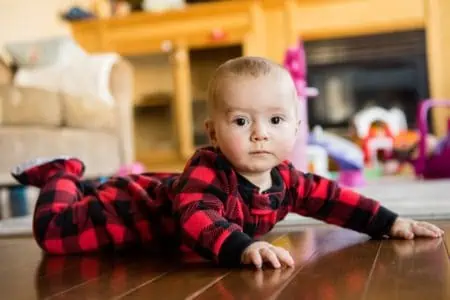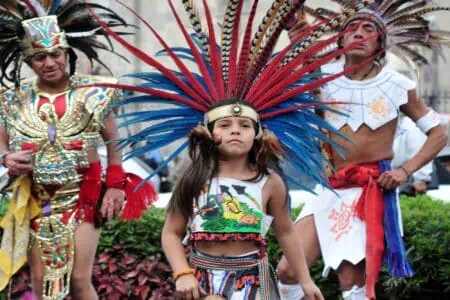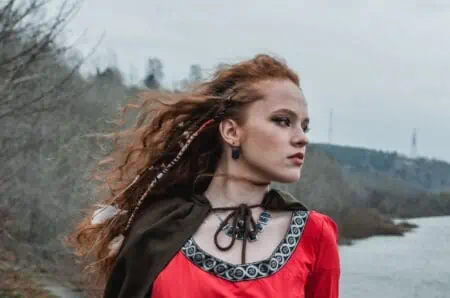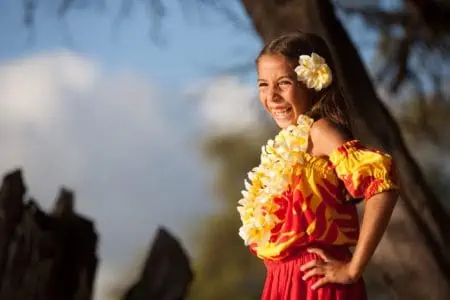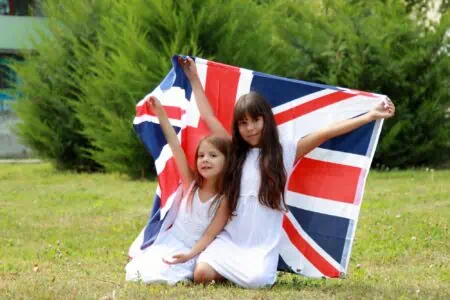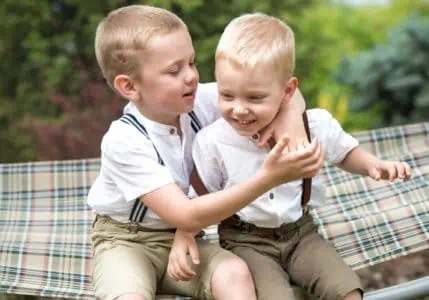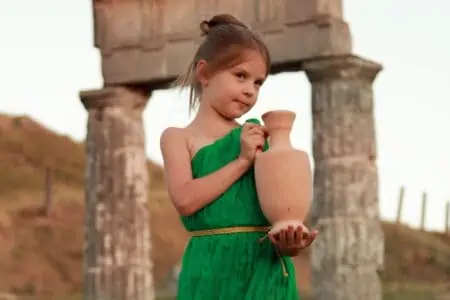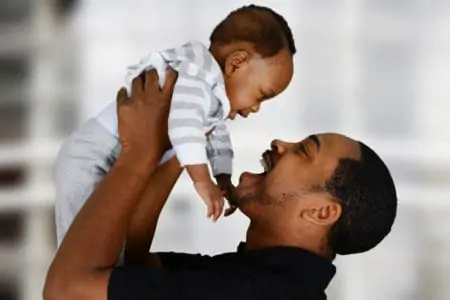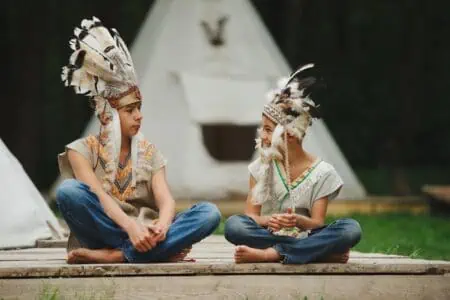There is something bold and regal about Scottish boy names. Deeply rooted in Scotland’s proud traditions and Celtic mythology, Scottish male names tend to be as memorable as its legendary creatures and mystical places.
Scottish mythology is known for its cultural and entertainment value. Scots have a knack for storytelling, so it comes as no surprise that many Scottish boy names come with cool meanings and intriguing stories.
From the traditional Lachlan to classic Duncan and trendy Knox, an extensive list of Scottish male names is curated just for you.
100 Strong Scottish Boy Names
Get started on our list of the best and most stylish Scottish boy names.
Alexander
Alexander is an anglicized form of the Scottish Gaelic name Alasdair meaning “defender of man.”
A common name among Scottish Highlanders, there have been three Scottish kings named Alexander. Alexanders of Menstrieare is a sept of the family Clan MacAlister, who descend from Somerland, Lord of Isles, a Gaelic Lord from the 12th-century.
Alexander is also used as a Scottish surname. As a Greek name, Alexander means “repulser of the enemy.” The name likely owes its popularity to the Macedonian conqueror, Alexander the Great.
Alasdair
This Scottish boy’s name has Greek origin and means “man’s defender” or “helper of mankind.”
Alasdair is the Scottish Gaelic version of the popular name Alexander. It can also be spelled similarly to Alastair.
Some notable personalities are Alasdair Allan, the Scottish politician, Alasdair Dickinson, the Scottish rugby union coach, and Alasdair Liddell, the British civil servant.
Archie
Archie means “genuine,” “bold,” or “brave,” and is a shortened version of the Scottish name Archibald.
Archie was one of the most popular names in England and Wales in 2017. It again came into the spotlight when the Duke and Duchess of Sussex named their baby boy Archie Harrison Mountbatten Windsor. It is usually pronounced as AHR-chee.
Let’s not forget the famous Archie comics that first appeared in 1942, which remain popular even today. Other notable personalities include Archie Roach, the Australian singer, and Archie Bradley, the American baseball player.
Arran
Arran means “exalted,” or “mountain of strength.” The Scottish Arran has a Hebrew origin and is a variant of the Biblical name Aaron.
In the Old Testament, it is mentioned that when Moses confronted the Egyptian king about the Israelites, Aaron (Moses’s brother) served as his spokesman. Aaron became the first priest of the Israelites.
Arran is also popular in other European countries, South Africa and Australia. Prince Arran was the founder of Caucasian Albania, while Arran Brown was a famous South African cyclist.
Athol
Athol means “new Ireland.”
This strong Scottish name for boys is a place name and was introduced as the first name in the 19th-century.
Athol is a classic, sophisticated name and could be apt for your bundle of joy. It can also be used as a surname. Athol Cooper, an English-Australian politician, Athol Fugard, a South African playwright, Athol Murray, a Canadian priest, and educator are the names of some noted personalities.
Bac
This Scottish boy’s name is derived from the English word “bakke” which, in turn, comes from the word “boec.” Bac means “bank.”
Bac is commonly used as a surname. Its origin dates back to the ancient Anglo-Saxon culture of Britain.
It has many variations such as Back, Backe, Bace, and Bache. Bač is a Slavic personal name that has been documented since the Middle Ages and is pronounced as Bach, in English.
Baird
Baird means “minstrel, poet.” It is a Scottish baby name and has a beautiful note to it.
Baird is also used as a surname and has the same roots as Bard, which also means “poet.”
According to the old legends, the first of the Baird Clan saved William the Lion from a wild boar and obtained land in Scotland. John Logie Baird is a famous personality who made the first mechanical television.
Bairn
Bairn is a Scottish name that means “baby.”
Bairn has originated from the Old English word Bearn. It also matches with the name Barn which is very popular amongst Scandinavians, Icelandic and Danish. Some spelling variants of this name are Barn, Bayn, and Bayne.
One of the Second World War coastal tankers of the United Kingdom is the SS Empire Bairn. This very Old English name is part of many English phrases and poems.
Balloch
This Scottish male name is derived from the English words bullock, or bulluc, which means “young bull.”
It’s most likely evolved over the years as a nickname or occupational name for a keeper of bullocks. Balloch was, in all probability, introduced from England. As a surname, it was first seen in Roxburghshire, in the Southern Uplands of Scotland.
Some of its spelling variations include Bullock, Bulloch, and Bulloc. Howard Balloch, a famous Canadian diplomat, is one of the notable personalities.
Barclay
The Scottish name Barclay comes from the Anglo-Saxon tribes of Britain, meaning “where birches grow.”
Barclay comes from the Barkley family that lived in the parish of Berkeley in Gloucestershire. It spread over Ireland and other countries when some Barkley family members shifted to these places.
Barclay is also famous as a surname. Some spelling variations include Berkeley, Barcely, Berkeley, Barcley, etc. Some notable personalities named Barclay are Charles Barkley, the American former basketball player, and Charles William Barkley, an English ship captain.
Bean
Bean is a Pictish-Scottish name that originated from northern Scotland. It comes from the Gaelic word Beathan or Betha, meaning “life.”
Like most Scottish names, Bean is also used as a surname. It was first found in Aberdeen in 1210, the name of a magistrate. Bean has multiple spelling variants such as Beane, Beyn, Bayn, Bene, Baine, and Beaine.
It became famous with the British sitcom, Mr. Bean. This series was met with widespread acclaim and had a large audience.
Bernard
The Scottish name Bearnard means “bear strong” or “bold as a bear.”
In English, it is spelled as Bernard or Bernhard. The name was popularized through Saint Bernard of Clairvaux and later became a popular name all over Europe.
It is also used as a surname and is the second most common surname in France. Bernard can be pronounced as ber-nar, bur-nerd or bur-nahrd.
Blair
Blair is a Scottish-Gaelic name derived from the word “blar.” It means “plain,” “meadow,” or “field.”
Blair is predominantly a masculine name, however it is also used for girls. This is more so in countries such as the United States. Blair is also very common as a surname.
Some notable personalities with this surname are Andy Blair, the Scottish footballer, Adam Blair, the New Zealand rugby league player, and Bonny Blair, an American Olympic gold medalist.
Boyd
Boyd has an Irish origin, meaning “fair-haired.” In Scottish, Boyd means “yellow” and “blonde.”
It is also popular as an Irish surname and comes from the Celtic term “Boidhe.” Boyd is common as a forename, as well as a surname in Scotland.
Boid is a spelling variant of Boyd. The name was first used as a surname in the 13th-century in Scotland. Boyd is a very popular name in the U.S. and topped the charts in the 1900s.
Bryson
Bryson comes from the Scottish personal name Brice. It may also be from the Gaelic name Bhris which means “saint.” As an English boy’s name, Bryson means “son of Brice” or “son of a nobleman.”
This catchy name is quite easy to pronounce. It started as a surname and slowly gained popularity as a forename.
Brycen is a variant of Bryson, meaning “speckled,” which makes it suitable for a cute boy with freckles.
Calan
Calan is a Scottish name that means “battle or rock.” In its Irish origin, Calan means “descendent of Cathalan.”
Calan is an alternate form of the Scottish-Gaelic name Cailean, also spelled as Callan, which in German means “chatter.” Other spelling variations include Caelan, Cailean, Callen, Calum, and Callahan. In Scandinavian, Calan means “flowing water.”
Calan is also used as a surname in the Irish and Scottish communities. The name is highly popular in the U.S. compared to its birthplace. This name is trendy and beautiful and can be apt for your little one.
Callum
Callum is again a Scottish-Gaelic name variant of the Latin name Columba, meaning “dove.”
A dove symbolizes purity, peace, and the Holy Spirit amongst Christians, which has been very popular amongst parents. It is also spelled as Calum.
Some notable personalities with this name are Callum Ah Chee, the Australian rules footballer, Callum Ball, the English footballer, and Callum Black, the American-born Irish rugby union player.
Cameron
Cameron comes from the Galic word “cams ron” which means “crooked nose,” or “cam abhainn,” thus leading to “crooked river.”
However, the name has its roots in Cameron, an area in Lennox or Edinburgh. Cameron is pronounced as Kam-ren. Even though the name is unisex, it is predominantly used to name boys.
Acclaimed actress Cameron Diaz made it popular among girls in the U.S. Variations include Camerin, Camren, Kameron, Kamran, Kamryn, and more.
Campbell
Campbell is a Scottish name meaning “crooked mouth” or “wry mouthed.”
Campbell is more of an Irish surname rather than a first name. It has its Gaelic roots and comes to words “cam” and “beul.” “Cam” means “crooked,” and “beul” means “mouth.” However, this shouldn’t stop you from trying out this name, as the Campbells are known as one of the most powerful clans of the Scottish Highlands.
Campbell is used more as a surname and showcases a family history of an influential and powerful family. Campbell is the 3rd most common surname in Northern Ireland. Campbell is popular worldwide, especially in the U.S., Canada, and Australia.
Clyde
Clyde is a Scottish name, pronounced as c-ly-de, meaning “the keeper of the keys.”
Clydealso means “warm,” as in personality-wise. Clyde is also used as a character description for caring and friendly people as a surname in Scotland. It was given to those who lived by the banks of River Clyde, which flows through Glasgow.
Some famous personalities with Clyde as a surname are Andy Clyde, the Scottish actor, Bradley Clyde, the Australian rugby player, and Ian Clyde, the Canadian boxer.
Colin
Colin is the short form of Nicholas, meaning “people of victory.”
The Scottish-Gaelic version of this name is Cailen. It is believed that Colin has both Scottish and Greek origins and is also used as a surname.
In England and Wales, Colin is a very popular name and tops the name chart. Some famous people are Colin Campbell, 3rd Earl of Argyll, Colin Bean, the British actor, and Colin Bell, the Manchester City and England footballer.
Cory
Cory is an Irish name that is also very popular amongst Scottish, meaning “from the rounding hill,” “seething pool,” or “ravine.”
Cory is also a variant of the Greek name Cora, the maiden name of the Greek goddess Persephone. In German, Cory means “the chosen one,” while following the Bible, Cory means “God’s peace.”
Cory can also be used as a short form of Cora, Corinne, or Corinna.
Davis
Davis is of Welsh origin and means “son of David.”
It is derived from the Hebrew name David which means “beloved.” Davis became very prominent due to the biblical King David of Israel.
It is pronounced DAY-viss, and is also a very popular surname. Bette Davis was a well-known American actress. Samuel George Davis, popularly known as Sammy Davis Jr, was an American singer, actor, and film producer.
Donal
Donal is a Scottish boy’s name, meaning “world leader.”
Donal also finds its roots in Irish and is derived from the proto-Celtic Domhnall language. This particular language is still spoken in modern-day Ireland, Scotland, England, and various parts of Europe. However, Donal is used more in English-speaking countries.
Donal is an anglicized form of the Irish name Dónall which again is derived from the word Dómhnall. Donal not only sounds good, but it’s also easy to spell, modern, and yet has an ancient Gaelic touch to it.
Douglas
Douglas is a Scottish-Gaelic name and comes from the words “dubh,”meaning “dark, black,” and “glas,” which means “stream.”
However, it is more of a habitational name and usually penchant of the residents belonging to places so-named in both Scotland and Ireland. The Douglas clan of Douglas, South Lanarkshire, is especially popular.
Often the short variant of the name Douglas is Doug. Douglas Abbott, the Canadian politician, Douglas Alexander, the Scottish politician, and Doglas Bader, the British flying ace, are notable personalities with this name.
Duncan
Duncan is a very popular Scottish name and variant of the Scottish-Gaelic name Donnchadh. Donn means “brown,” and cath means “warrior.”
The name is Anglicized in Ireland as Donagh or Donaghue. Duncan was one of the earliest known names in Scotland and originated from Ireland. Duncan is also used as a surname, and the Duncan clan has many mentions in history.
In Shakespeare’s Macbeth, King Duncan followed his grandfather as king after his death. Dunc is usually the short form and could also make a great first-name alternative.
Errol
Errol is a beautiful Scottish name that means “Earl,” and “nobleman.” In English, Errol means “army commander,” the one who wields power. In Latin, Errol means “wandering.”
It is also used as a surname in Scotland and is also popular in Latin, German, English, and American languages.
Errol Anderson, the founder of the New Zealand Trustees Association, Errol Barnett, the anchor and correspondent for CNN International, and Errol Barrow, the first Prime Minister of Barbados, are famous personalities.
Erskine
Erskine is a classic name of Scottish-Gaelic origin, meaning “high cliff” and “verdant hill.”
It is also popular as a Scottish surname which is essentially habitational in nature. People coming from Erskine, a place on the southern bank of the River Clyde, near Glasgow are known by this name or surname.
According to history, it was in 1225 that the Erskine’s were first recorded as Erskin. The name has many spelling variants, such as Irskin, Harskin, Irschen, and Yrskin.
Evan
Evan is a very popular name and originated in the Indo-European language, meaning “the Lord is gracious.”
Evan is a variation of the English name Johnand the Spanish name Juan. It is a handsome name with style and can be a great choice for your little one.
The name also has Hebrew origins and is a variant of the Hebrew name Yohanan, which means “rock.” Evan is often used as a short version of the Greek name Evangelos which means “good messenger.”
Farlan
Farlan is a beautiful Scottish name meaning “son of furrows.”
It is also used as a surname in the form of McFarlan. This unusual name can be considered if you want your child to stand out from the crowd. Ferlan is a similar-sounding name that means “a man from the country. “
Some of the notable personalities with this surname include Alex McFarlan, an American baseball player, and Dan McFarlan, the rugby union coach.
Fergus
Fergus is a Scottish and Irish name that means “the strong one” or “the masculine one.” Its variant, Feargus, has a Gaelic origin.
Fergus is also common as a surname in Scotland, particularly in the places such as Perthshire and Ayrshire. Other similar names are Ferguson, Fergusson, and Kerruish.
The name showcases masculinity, strength, and power. Alex Fergus, the Scottish footballer, and Sir Howard Fergus, the Montserratian writer and historian, are two notable personalities with Fergus as a surname.
Fingal
Fingal is a Scottish name with an Irish-Gaelic origin, meaning “fair stranger.”
The name is derived from the medieval territory of Fine Gall and was initially used as a nickname for the Viking invaders settled in the north of Dublin.
Fingal’s Cave is a sea cave in the inner Hebrides of Scotland. Around 250AD, an Irish general named Fingal put their foot there. Fingal is also believed to be the father of Ossian, the traditional bard of the Gaels.
Finlay
Finlay is a charming Scottish name for boys.
Its Gaelic variation is Fionnlagh, which originates from “fionn” and “laogh.” “Fionn” means “white or fair,” and “laogh,” means “warrior.” Bringing us to the gorgeous meanings: “fair-haired” and “courageous one.” The name also means “blonde warrior.”
Finlay is quite on-trend these days and famous as a Scottish royal name.
Some notable personalities with this name are Finlay Mickel, the Scottish skier, Finlay Calder, the Scottish rugby player, and Finlay McNaughton Young, the Canadian senator.
Finn
Finn is a Scottish name of Gaelic origin, meaning “a fair-haired man.”
Finn or Fynn also is a Nordic name and means “man from Finland.” Whether you love the name for its Irish roots or are just in love with the fictional character, Huckleberry Finn, this is a great name that is strong yet simple.
Finn Atkins, the British actress, and Finn Carter, the American actress, are notable people with this name. However, Finn is still trending as a boy’s name in most countries.
Fletcher
Fletcher is derived from the Old English name Fulcher or Old French name Flechier which means “arrow maker.”
It is an occupational name given to an arrowsmith – a maker and seller of arrows. Fletcher is used both as a first name and surname. In the Scottish-Gaelic language, it was first known as Fleisdear and later anglicized to Fletcher. In Wales, there are various references of Fletcher as a surname around the 16th-century.
Some notable personalities with Fletcher as a first name are Fletcher Benton, the American sculptor, Fletcher Bowron, the mayor of Los Angeles, and Fletcher Harper, the American publisher.
Forbes
Forbes is a Scottish baby name, meaning “field.” It is believed to be a habitational name near Aberdeen.
It has Gaelic origin and means “wealthy” or “stubborn.” Forbes is also used as a surname which is derived from the Scottish Clan Forbes.
George Forbes, the New Zealand politician, and John Forbes, the British Army officer, are famous people with this name.
Frasier
Interestingly, Frasier is predominantly a boy’s name, meaning “strawberry.” It comes from the French word “fraise”with the same meaning.
The name was originally de Frisselle or de Freseliere. Frasier is also considered a variant of the name Frazer.
You may know of Frazer Hines, who played the role of Jamie McCrimmon in the television series Doctor Who. Dr Frasier Winslow Crane is also a famous fictional character on the American television sitcom Cheers.
Fyfe
Fyfe is a trendy option among our Scottish boy names meaning “from Fifeshire.”
Fifeshire is a place in Scotland. The story of the Fyfe family started amongst the Pictish clans. They lived in the county of Fife.
Fyfe is also used as a surname and is a top trending surname across Europe these days.
Gavan
Gavan is a Scottish men’s name of Welsh origin. It comes from the Medieval name Gawain and means “white falcon” or “little falcon.”
Gavan has been found in Hindu mythology, where it means “Lord Budha.” Some notable people are Gavan Daws, the American writer, and Gavan McCarthy, the Australian footballer.
Gavan is also used as a last name. For example, Alexandru Gavan, the Romanian mountain climber, and Paul Gavan, the Irish politician.
Gilmore
Gilmore means “servant of the Virgin Mary.” It comes from the Scottish-Gaelic word Gille-mohr which means “great servant.”
Gilmore is also an Irish surname and has two separate meanings. In County Armagh, Gilmore is an Anglicised form of the word “Mac Giolla Mhura.”It means “servant of St. Mura.”
In County Sligo, Gilmore is an Anglicised form of “Mac Giolla Mhir.” This means “son of the spirited lad.” Irrespective of what it means, the name has faith, religion, strength, and a pious meaning.
Gilroy
Gilroy is the Anglicized form of the Gaelic Mac Giolla Ruaidh, meaning “son of the red-haired lad.”
It is also famous as a Scottish surname with the meaning “a king’s servant.” The name talks about the red-haired lad who will eventually serve the king.
It’s usually pronounced as GIL-roy. Some notable people with Gilroy as a surname are Dan Gilroy, the noted film director, and Beryl Gilroy, the British novelist.
Gordon
Gordon means “great hill.”
Originally, it was used as a surname, such as Charles George Gordon, the British Army officer and administrator. He fought in the Crimean war and was known as Chinese Gordon and Gordon Pasha. Nowadays, Gordon is used both as a forename and a surname.
This Scottish name has become famous and very familiar in nearly every English-speaking household, thanks to the famous Masterchef, Gordon Ramsay. It is a strong, traditional, classic name, yet very popular.
Graham
Graham comes from an Old English place name meaning “gravelly homestead.”
Remember Alexander Graham Bell, the Scottish-born inventor who invented the telephone. Graham was a popular Scottish surname in the 12th-century. Later, Sir William de Graham founded the Graham clan, and the name began to be used as a forename.
Though predominantly a boy’s name, Graham has been occasionally seen as a girl’s name. One such example is Graham Cockburn, the daughter of Lord Cockburn. Variant spellings of this name include Grahame and Graeme.
Grant
Grant comes from the French word “graund,” and means “tall” or “large.”
Grant was originally a nickname for people who are tall and large. The famous British actor Hugh Grant is a living example. It was more famous as a surname in English, Scottish and French areas.
With time, it became popular as a forename, with a solid British-Scottish sound to it. Other famous personalities are Grant Gustin, the American actor, and Grant Hart, the American musician.
Gregor
Gregor is a Scottish name of Greek-Norwegian origin, meaning “watchful” or “vigilant.”
Gregor is an Anglicized form of the Scottish-Gaelic name MacGriogair meaning “son of Griogar.” Gregor is also used as a surname, especially amongst the Gregor clan.
Gregor Duncan was a Scottish Episcopalian bishop. Gregor Brown is a young Scottish rugby union player born in 2001.
Gunn
Gunn is believed to be an Anglicized form of Gaelic Mac Gille Dhuinn, meaning “son of the servant of the brown one.”
Gunn clan is a very famous Scottish clan in northeastern Scotland. It also includes places such as Caithness, Sutherland, and Orkney Isles.
However, Gunn is also considered a famous English occupational name. The people who operate a siege engine or cannon are usually given Gunn as a nickname. Though predominantly an English name for boys, Gunn is also a female Norwegian first name.
Hamish
This Scottish name comes from the Scottish Gaelic names Seumas and Sheumais. It means “supplanter” or “may God protect.”
Hamish is also a common English name, used as a nickname too. Hamish is said to be the Scottish variant of James, which comes from the Hebrew name Jacob.
Some notable personalities are Hamish Blake, the Australian comedian, and Hamish Bond, the Olympic gold medalist.
Hay
Even though Hay is a common Scottish name that is popular these days. It comes from the Old French term “haye,” meaning “hedge.”
The name originated from northern France when some French people settled in England after the conquest of England by William of Normandy.
Over time, the name has spread in Europe and North America. Hay is also a popular surname in the United States. A few notable personalities carrying this surname are Barry Hay, the Dutch musician, and Bill Hay, the Canadian ice hockey player.
Henderson
Henderson is both Scottish and Northern Irish, meaning “son of Henry,” while Henry means “home-ruler,” or “ruler of the home.”
Henderson is the anglicized form of M’Kendry and the Scottish Gaelic form of Mac Eanruig. A noted person is Henderson Walker, the Acting Deputy Governor of North Carolina.
Over the years, Henderson has gained popularity as a Scottish surname too. Jordan Henderson is an English professional footballer.
Houston
Houston is primarily a boy’s name of English origin, meaning “from Hugh’s Town.”
Houston is a habitational name, usually given to the residents of Houston, near Glasgow, Scotland. Now it has spread in many English-speaking countries and is a famous girl’s name in the USA, mainly Texas.
Houston is also a famous Scottish surname. Examples include Alasdair Houston, the English biologist, and Allan Houston, the American basketball player.
Ian
Ian is a Scottish-Gaelic name and variant of John, which comes from the Hebrew name Yohana, meaning “God is gracious.”
Ian is typically pronounced as ee-un. It has many spelling variations such as Iain, Iann, Eion, Ean, etc.
Celebrities with this name are English actors Ian McShane and Ian McKellen. Ian Joseph Somerhalder is an American actor best known for his role as Damon in The Vampire Diaries.
Irvin
Irvin means “handsome and fair-faced.” The name is derived from the Scottish surname Irvingor is a variant of the Anglo-Saxon name Eoforwine.
Irvin has multiple spelling variants. Irwyn, Ervin, Erwyn, Everwyn, etc. is pronounced as ER-Vihn and ER-v-ih-n.
Even though it’s unique in Scotland, it’s more prevalent as a surname in the U.S. Some noted people with this name are Irvin Cobb, the American author, and Irvin Khoza, the South African sports administrator.
Irving
Irving is a Scottish boy’s name, meaning “green river” or “sea friend.”
It is a variant of Irvine and originates from a place name, the eponymous River Irvine in southwestern Scotland. In the 1880s, the name started appearing, and by the 1900s, it became quite popular both in Europe and the United States.
Irving is pronounced as Ur-VIEN. Famous bearers are Irving Berlin, a famous songwriter, and Irving Langmuir, a Nobel prize winner in Chemistry.
Jackie
In Scottish, Jackie means “God is gracious.” It is based on the names John or Jacques.
Even though primarily a boy’s name, Jackie is also used as a name for girls. It is a diminutive form of the name Jacqueline.
Jackie Chan is a very famous actor and martial artist. Jacqueline Kennedy Onassis, wife of American president John F. Kennedy, was popularly known as Jackie.
Jamieson
Jamieson means “supplanter,” “ he who supplants” or son of James.”
This Scottish male name is a hot favorite and ranks higher as a popular name in Scotland and countries like Canada. In the USA, however, it is a popular surname.
The name has its roots both in the Hebrew language and in Old English. Jamieson is pronounced as JAY-MI-suhn.
Jock
This Scottish name has a beautiful meaning of “God is gracious.”
Jock Zonfrillo, the famous Scottish chef in Masterchef Australia, wore his traditional dress in the grand finale of this very famous Australian show with millions of viewers worldwide.
To date, Jock is very popular in Scotland and other English-speaking countries. Other famous bearers include Jock Mahoney and Jock Wallace.
Kai
In Welsh, Scandinavian and Greek language, Kai means “keeper of the keys” or “earth.”
Kai is also a very famous name in Southeast Asian countries, especially Japan, China, and Korea. In Japanese culture, Kai means “shell.” In Hawaiian culture, it means “sea.”
Apart from these places, Kai is also popular in African, Native American, and Turkish cultures. This name is undoubtedly very popular all over the world.
Kameron
Kameron is an unusual Scottish boy’s name meaning “crooked nose.”
The Americanized version of the Scottish name Cameron is derived from the Gaelic words “cam” and “sron.” The name is pronounced as KAM-er-en.
Other variants of the name include Kamryn, Camron, Camren, and Kamron. Kameron has become popular as a surname as well.
Keith
Keith is a Scottish name popular amongst boys and has multiple meanings such as “wood,” “forest,” and “from the battleground.”
The name was adopted in the 19th-century. It is also used as a surname and is very popular in the U.S.
Keith Beavers, the Canadian backstroke and medley swimmer, and Keith Andrews, the Irish footballer, are popular bearers with this name.
Kennedy
Kennedy means “chief with helmet,” or “leader.” The name is an Irish Anglicised version of Cinneidigh.
Although Kennedy is of Irish and Scottish origin, it is quite popular worldwide, especially in English-speaking countries. John F. Kennedy, the 35th President of the United States, championed the U.S. space program and introduced a dynamic form of leadership.
Other notable personalities are Kennedy Brooks, the American football player, and Kennedy Graham, the New Zealand politician.
Kenneth
This Scottish name comes from the Gaelic name Coinneach, meaning “handsome” or “fireborn.”
History speaks about Kenneth Macalpine, who brought the Stone of Destiny from Dunstaffnage Castle and deposited it in Scone, which Edward I conveyed to Westminster Abbey. The Stone was an ancient symbol of Scotland’s monarchy used for centuries for the oath ceremony of the kings.
The short-form of Kenneth is Ken or Kenn. Kenneth is not only popular in Scotland but also in other European countries.
Kenzie
A beautiful Scottish name with Gaelic roots, Kenzie means “handsome” or “good looking.”
Kenzie is the shortened version of the Scottish Mackenzie. Kenzie originated from the traditional Gaelic name MacCoinnich which stands for the “son of Coinneach” and translates to “son of the bright one.”
Primarily a boy’s name, Kenzie is also gaining popularity for naming girls. Mackenzie Ziegler is an American actor and dancer.
Kin
Kin is another gender-neutral name popular in Scotland. It comes from the Old English word Cynn, which means “family,” and “race.”
Kin has several origins that is popular throughout the world. In Japanese, Kin means “sun” or “golden.” It is also a variant of the Korean name Kim and is thought to be of Hungarian origin.
Kin is found amongst the Chinese community in Singapore as a last name.
Kirk
Kirk is a Scottish name that means “church.” It is an informal name for the Church of Scotland.
Some say Kirk is of Scandinavian origin. It’s been used as a habitational surname for people who lived near the church or worked in the church.
The name is very popular due to the famous fictional character James T. Kirk, the Captain of the starship Enterprise, on Star Trek.
Knox
Knox is a Scottish name with a northern English and northern Irish origin. It originated from the Old English word “cnocc,” which means “round hilltop,” or “round-topped hill.”
Knox was a habitational name for people who lived on the hilltop. Knox is also used as a surname. John Knox is a well-known personality who brought about the Reformation in Scotland.
Knox is now a very influential name, listed in the charts of celebrity baby names. Remember Knox Jolie Pitt, the youngest child of Brad Pitt and Angelina Jolie.
Lachlan
Lachlan means “from the land of lakes” and is of Irish and Gaelic origin.
Lachlan also has a strong connection to Norway or Viking origin and means “warlike.”
It is pronounced as l(a)-ch-lan. The name is common in Scotland, Ireland, England, Australia and New Zealand. Lachlan was in Australia’s top ten baby names between 2000 and 2010.
Lamont
Lamont is a Scottish name derived from the medieval name Lagman. This again is from the Old Norse Logmaðr, and has two elements. “Log” is plural for “lag,” meaning “law,” and “maðr” means “man.”
As a surname, Lamont has a dual origin, in Scottish and French. In the latter case, Lamont is a habitational surname for people who reside in Amont, meaning “upstream” or “uphill.”
Famous personalities include Lamont Bentley, the American rapper, and Lamont Bryan, the German-born Jamaican rugby player.
Laurence
Laurence is a Scottish name. It is also used as a surname that originated in Perthshire, a historic county of central Scotland. Laurence means “son of Laurence.”
It is the anglicized form of the Gaelic Mac Labhruinn. Laurence is derived from the Latin name Laurentius. It’s a habitational name, often given to people from the ancient town of Laurentum.
Laurence is found in many medieval manuscripts, especially of Anglo-Saxon origin. Some famous bearers are Laurence Fishburne, the American actor, and Lawrence Harvey, the British movie star.
Leith
Leith is a delightful choice among our Scottish boy names, meaning “flowing water” in Celtic.
The Water of Leith is the main river flowing near Edinburgh in Scotland. Leith is a habitational name, usually given to the residents staying near the river. It is more popular as a boy’s name, however, also used as a girl’s name in recent decades.
Leith is pronounced as LEETH. It is also pronounced as Laith, which corresponds to a famous Arabic name that means “lion.”
Lennox
Lennox is a Scottish-Irish name that means “elm grove.” As a biblical name, Lennox means “smooth farm.”
Originally, Lennox was a surname and meant for the families staying in Levenach, Scotland. Gradually it became a habitational name and was given to people from the district.
It can also be spelled as Lenox. The British boxer Lennox Claudius Lewis is an Olympic champion.
Lewis
Although a popular name in Scotland, Lewis is of Germanic origin, meaning “famed warrior” or “renowned.”
It’s an Anglicized form of the name Llywelyn. Lewis is also said to be the English version of the Irish name Lugaid. A strong name that’s easy to spell and pronounce, Lewis is suitable for a child with leadership qualities.
Lewis is also used frequently as a surname. Aylwin Lewis and Reginald Lewis are noted businessmen, while Ken Lewis was the CEO of the Bank of America. The English writer, Charles Lutwidge Dodgson was better known by his pen name Lewis Carroll.
Lindsay
Lindsay is a Scottish boy’s name that means “a lake” or “a place of Linden trees.”
In recent years, Lindsay has gained popularity as a girl’s name. Lindsay Lohan is a well-known American actress, songwriter, and producer.
Variations of this name include Lindsey, Lyndsay, Lyndsey, Lindsee, and Lindsy. Other famous personalities with this name are Lindsay Wagner and Lindsay Price.
Mac
Mac is a beautiful Scottish boy’s name of Scottish-Gaelic origin, meaning “son of.”
Mac is also used as a surname prefix for Scottish and Irish surnames. Other spelling variants of this name are Mack, Mak, Macky, Mackie, etc.
Some famous personalities are Mac Davis and Mac Taylor. It’s also used as a nickname for other big names such as McDonald.
Malcolm
Malcolm is a Scottish Gaelic name, meaning “devotee of Saint Columba.” Saint Columba was an Irish abbot who was instrumental in spreading Christianity in Scotland.
The name is distinctive yet beautiful. It has a Scottish appeal, yet is very English.
Malcolm III was the king who killed Macbeth. Malcolm in the Middle is a highly rated American family television series.
Mitchell
Mitchell means “who is like God.” Mitchell is taken from the Middle English and Old French name Michel which, in turn, comes from the Hebrew name Michael.
Mitchell is also used as a surname and adopted from English and Irish languages.
Mitchell is a popular name in Scotland, the United States, England, Australia, Canada, and South Africa.
Murdoch
Murdoch is an Irish-Scottish name, meaning “the son of the sea” or “protector of the sea.”
Murdoch is derived from the old Gaelic words, “mur” which means “sea” and “murchadh” which means “sea warrior.” Murdoch has several variants, such as Murdoc, Murdy, and Murdoch.
Famous people include Murdoch Stewart, Duke of Albany, and Murdoch Macdonald, the British politician. Murdoch is also used as a surname. Two examples are Billy Murdoch, the Scottish footballer, and Alister Murdoch, the Australian air marshal.
Ness
Ness means “from the headland.” It has Scottish-Scandinavian origin. In Hebrew, Ness means “miracle.”
Ness has been used as a topographical name. These were the people who lived on a headland. With time, the name has gained popularity amongst common people.
Ness is also used as a habitational name amongst Germans who come from Nesse in both Oldenburg and Friesland. A noted person is Ness Edwards, a Welsh Labour Party politician.
Niall
A famous Scottish name for boys, Niall means “champion” and “coming from the clouds.”
Scottish and Irish legends talk of Niall of the Nine Hostages. Niall was known as a fearless and energetic warlord who captured and brought a young slave to Ireland on a raid in Wales. The latter escaped and became St. Patrick, Ireland’s patron saint.
Niall James Horan is an Irish singer in the English-Irish boy band, One Direction. Niall is normally pronounced as NEE-al or NIGH-al.
Noah
In its Hebrew origin, Noah comes from the word Noach, meaning “rest” or “repose.” Noah is popular in Scotland, the USA, Canada, and the UK.
In the Bible, Noah survives the Flood and gains God’s blessing. Due to his loyalty and dedication to God, Noah was given the responsibility of building the Ark and, in doing so, keeping the human race alive.
Noah is pronounced as no-ah. Noah topped the list for most popular baby names in the U.S, from 2013 to 2015.
Ogilvy
Ogilvy is a Scottish name that means “from the high peak.”. It’s a locational name given to people from the barony of Ogilvie near Glamis in Angus.
It is also a famous surname derived from an ancestor with this name. In this case, Ogilvy means “the son of Ogle.”
Several spelling variations are Ogilvie, Ogilvy, and Ogilby. David Ogilvy founded the New York City-based British advertising agency Ogilvy & Mather.
Payton
Payton is a unisex Scottish-Irish name that means “patrician” or “noble.” The name has its roots in the Old English language.
Payton is the Anglicized form of Gaelic Ó Peatáin, the descendants of Peatán. Payton is also a surname, derived from a place meaning “Pœga’s town.”
Payton is very popular these days in the United States and is more popular as a girl’s name. Payton Banks is an American professional wrestler, while Payton Haas is an American actor.
Quinn
Quinn is a gender-neutral name with Irish, Gaelic, and Latin origins, meaning “head” or “wise.”
Quinn is pronounced as KWIN. It is a common surname in Ireland and a modern take on the Irish surname O’Cuinn and firstname Conn.
Quinn also means “descendant of Conn.” As a girl’s name, Quinn means “a girl who is as pretty as two.”
Ramsay
Ramsay is a popular Scottish name and surname, meaning “wild garlic” or “from Ram’s island.”
The name originated as a topographic name in England during the Anglo-Norman era. It is a take on the Latin placename “de Rameseia,” which is situated in England.
Ramsey is a spelling variation of Ramsay and is often used as a surname. You may have heard of the popular celebrity British chef and restaurateur Gordon Ramsey. Ramsey is also a surname for the residents coming from the town of Ramsey in the UK.
Robert
An ancient Germanic name, Robert means “famed,” “bright,” and “shining.” Robert is also a modern take on the Irish name Roibeárd.
Robert is popular across Scotland, England, Germany, France, and the Netherlands. Over the years, it has gained popularity as an English name.
Famous personalities include Robert Burns and Robert F. Kennedy.
Rodrick
Rodrick means “famous ruler” in Scottish and is quite popular as a surname.
It has Old German origin and is an alternate spelling of Roderick. Some spelling variations include Rodrique, Rodrik, Roddrick, and Rhodric.
Some famous bearers are Rodrick Rhodes, the American basketball player, and Rodrick Wayne, the American rapper.
Ross
Ross means “from the peninsula.” It comes from the Gaelic word “ros” meaning “headland.”
Ross-shire is a county in the highland area. In its German origin Ross means “mighty horse.”
Some famous people are Ross Allen, the American herpetologist, and Ross Aloisi, the former Australian footballer.
Scot
Scot may simply mean “a Scotsman” or “a person from Scotland” and originates from Latin. As a name, Scot also means “Gaelic speaker” or “wanderer.”
This stereotypical name comes from English and Scottish surnames and is linked to Uchtredus Filius Scoti mentioned in 1120 in Scottish history.
Scott is a spelling variant, as in the case of Scott Adams, the American cartoonist, and Scott Adkins, the English actor.
Shaw
Shaw is a Scottish masculine name that means “dweller by the wood.”
Shaw also has English roots, derived from various Old English and Middle English words such as “shawe,” “schage” and “sceaga.” Another origin of Shaw is the Gaelic name “Sitheach” which means “wolf.” It was originally a habitational name that eventually gained popularity across the country.
Shaw is also a popular surname, established in Ireland in the 17th-century. Famous personalities include Shaw Clifton, 18th General of the Salvation Army, and Walter Shaw Sparrow, the British writer.
Sinclair
Sinclair has a Scottish origin and means “bright” or “clear.” As a French name, Sinclair also means “from St. Clair, France.”
The name is derived from a powerful Scottish clan known as the Sinclairs. They were Highland Scottish clans who held lands in Lothians, Orkney Islands, and Caithness, places in the North-eastern tip of Scotland.
It was previously a habitational name but has spread to other English-speaking countries. Other spelling variants are Saint-Clair and St. Clair.
Stewart
Stewart is a stylish Scottish name for boys meaning “guardian.”
It was originally a popular surname used as a given name as well. It has been revealed that half of all men with Stewart as surname or name are directly connected to Scotland’s royal dynasty.
Later it gained popularity and is now very common across Europe and America. Some spelling variations of Stewart are Steward, Steuart, and Stuart.
Stuart
Stuart is the French form of the Scottish surname, Stewart, meaning “guardian” or “warden.”
Remember the American animated comedy movie Stuart Little? Well, there is more to the name than the mouse’s popularity. In the 16th-century, Mary Stuart introduced the French form of the Scottish Stewart to Scotland. She was the queen of Scotland from 1542 to 1567.
Other notable personalities are Stuart Hall, the Jamaican-born British sociologist, and Stuart Broad, the English cricketer.
Thomas
Derived from the Aramaic name Ta’oma’, Thomas means “twin.”
Thomas is mentioned in the New Testament of the Christian Bible as Thomas, the Apostle. So it’s a really popular name among Christians. Commonly used nicknames for Thomas include Tom and Tommy.
Famous people include Thomas Edison, the American inventor, and Thomas Sanders, the American singer.
Todd
A popular baby name in Scotland, Todd means “fox.”
Attributes of the name Todd include “clever” or “a willy person” – such as a fox! More than a first name, Todd is popular as a nickname.
Famous bearers are Todd Anderson, the Australian rugby player, and Todd Woodbridge, the Australian tennis player.
Torrence
Torrence is a Scottish-Irish name, meaning “from the craggy hills” or “from the hillocks.”
“Tor” may refer to a “watchtower” or “craggy hilltops, with rough slopes.” The Gaelic word “torran” means “little hills” or “hillocks.” Thus Torrence is a habitation name for hilly areas such as East Kilbride or north of Glasgow.
Other spelling variations you can consider are Torence and Torrens.
Tyree
Tyrie is of Scottish origin and means “from Tyrie.”
The name is closely associated with the Old Norse god of war and justice, Tyr. It’s also linked to the descendants of the people of Dalriada, a place in ancient Scotland.
Tyree Davis, the American football player and Tyree Glenn, the American musician, bear this unique name. Tyrie is predominantly a boy’s name, but it is now gaining popularity for naming girls.
Uilleam
UiIleam has its origin in the Scottish-Gaelic language, meaning “resolute protector” or a “willing protector.”
Uilleam is equivalent to the English name William, and has been mentioned several times in Scottish history.
Uilleam Earl of Mar is known for constructing the greatest castle of the 13th-century- Kildrummy Castle in northern Scotland. Uilleam Uallas, also known as Sir William Wallace, was a famous Scottish knight. He led the Scottish forces in the First War of Scottish Independence.
Uisdean
Uisdean is a Scottish-Gaelic name meaning “intelligent” or “island stone.”
This unique name can also be spelled as Hùisdean. Uisdean is derived from the Old Norse personal name Eysteinn. “Ey” means “always,” and “steinn,” means “stone.” Thus a young Eysteinn and Uisdean has the potential of becoming strong-willed and determined.
The anglicized version of Uisdean is Hugh, as in the case of the Scottish clan chief, Hugh of Sleat. His clan later came to be known as Clan Uisdean.
Urquhart
Urquhart is a Scottish name that has its origin in the ancient Celtic culture, meaning “one who came from Urquhan.” It is derived from Airdchartdan, a 7th-century Gaelic name which stands for “by the woods.”
Urquhart is a habitational surname as well. As a clan name, Urquhart comes from Glen Urquhart, a valley running to the west of the village Drumnadrochit.
Clan Urquhart had been known for holding power in northeast Scotland. There is an Urquhart Castle in the Highlands, beside Loch Ness.
William
A timeless Scottish boy’s name belonging to several kings of the British Isles, William is an English name meaning “strong-willed warrior” or “resolute protector.”
William is derived from Wilhelm which has Old German roots. It comes from two German words, “willeo” which means “will and “determination” and “helm,” meaning “protection.” William the Conqueror introduced this name to England during his great Conquest.
William is a timeless classic with English roots that dates back almost a thousand years yet is still popular today.
Wallace
Wallace is of Scottish-English origin, and means “stranger.” Wallace is considered the English version of the Medieval Gaelic name Uallas.
This gender-neutral name is popular among Christians. In its French origin, Wallace means “foreigner,” and comes from the Old French word “waleis” meaning a “welshman.” The Wallace clan comes from the Lowlands and is recognized by Lord Lyon King of Arms, the head of the Lyon court.
Wally makes a cute nickname for Wallace. Notable people include the football player Wallace Gilberry, baseball player Wally Moon and the poet Wallace Stevens.
